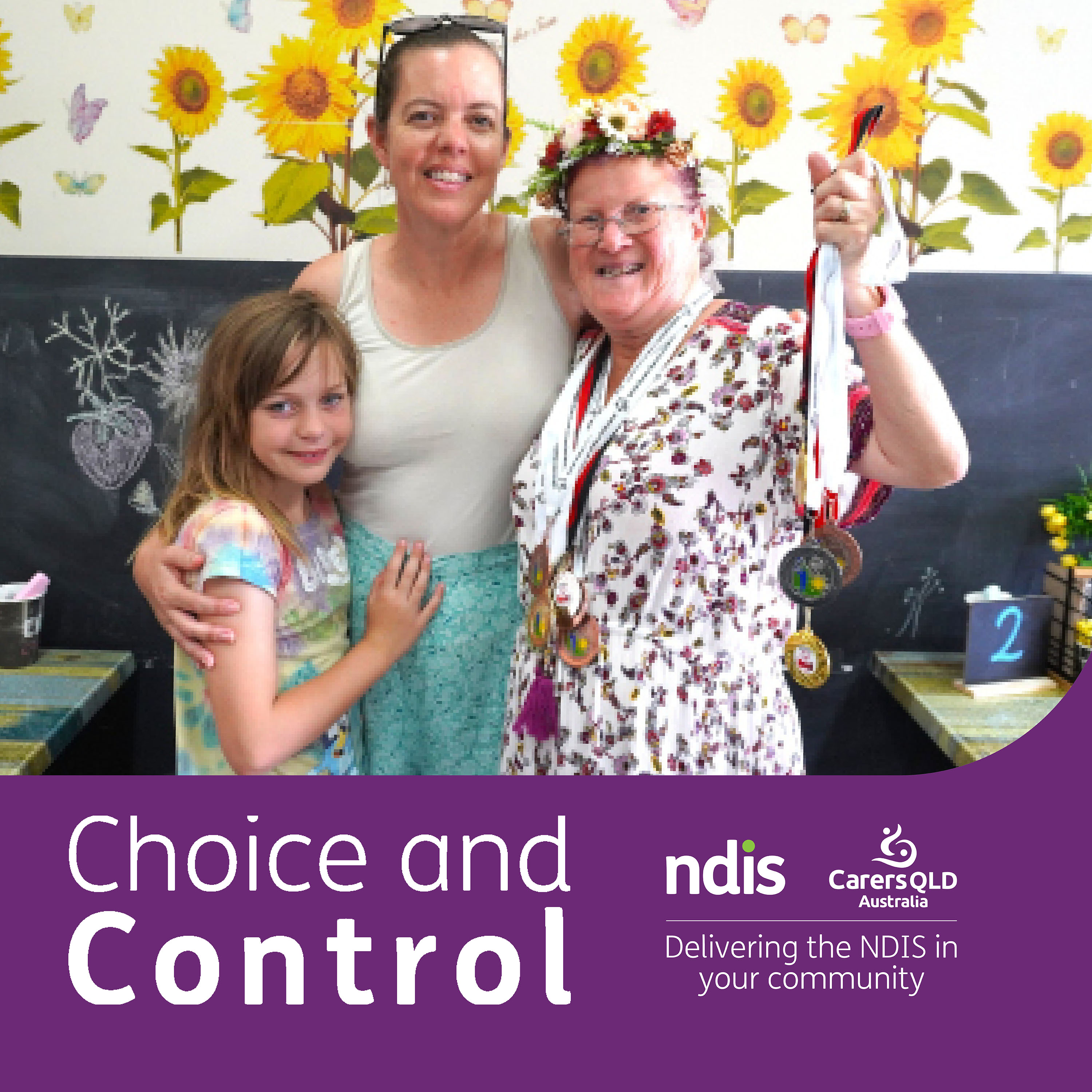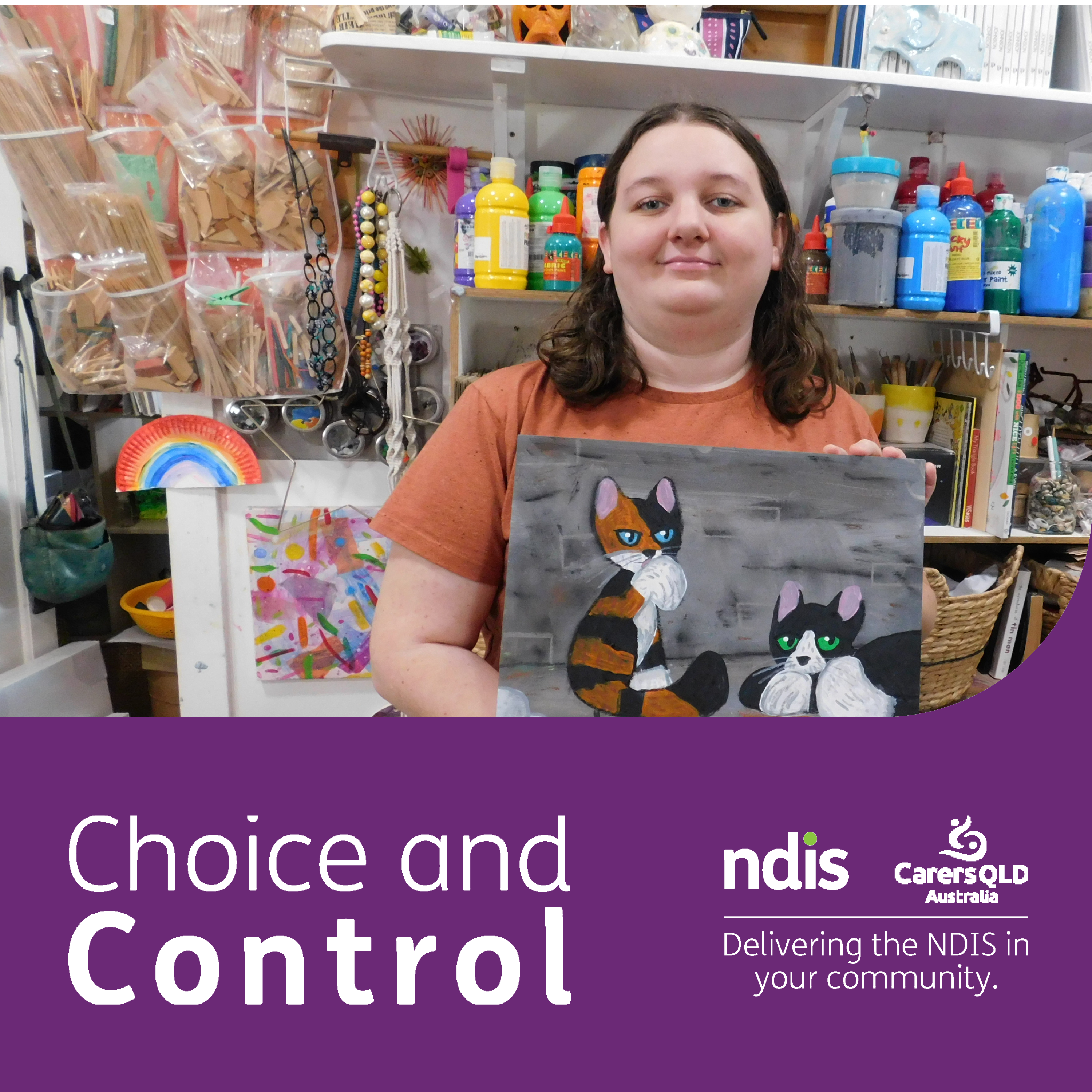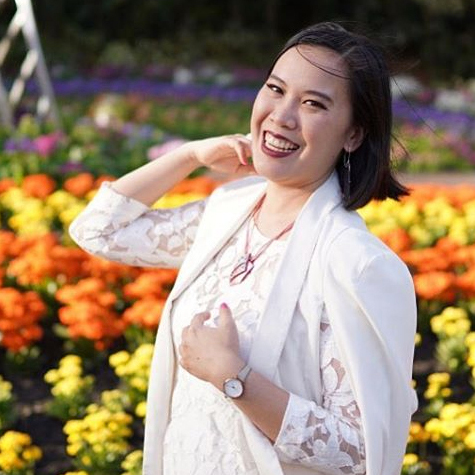Speaker 0 00:00:00 AAC Connect. It's a new way to stay in touch with your local area coordinator, carers Queensland, with everything you need right here on your device. It's a handy app to keep track of your L a C appointments, browse workshops and events, check out information and support, and get the latest news stories and podcasts. It's available on Android and iOS, so whatever device you have, you can stay in touch. Head to our website to sign
[email protected] au and look for Connect Joyce and Control a podcast celebrating people with disability. Brought to you by carers, Queensland, N D I S, local area coordination partner in the community pharmacist model, disability advocate. Speaker Instagrammer, Sarah Shams has a lot going on. She's a bilateral above knee amputee and currently studying a master's of public health as she works towards getting disability on the agenda in public policy, the media, even the fashion world. She's a powerhouse of ideas and enthusiasm and credits. The support around her for helping turn her dreams into goals and her goals into achievements.
Speaker 2 00:01:17 I think it has to probably be a part of my personality, but also it's a very supportive family and friends and I think I couldn't have done, or, you know, doing what I am doing today without their support. And my parents have always been encouraging me and supporting me in my adventures. The result may not always be good, but you know, the journey that has taken me to around today. So I am proud of the achievements that I have made.
Speaker 3 00:01:44 Why did you start? Um,
Speaker 2 00:01:45 Pharmacy? I have always been interested in healthcare. Both my parents are doctors and pharmacy was a profession that I saw as a really loved the customer. Patient interaction between the pharmacist. It was one of the things that attracted to me to that profession, um, as well as the fact that we can help people, you know, every day of their lives basically. Um, whether it be a little cold or help with their medications or whatever else it may be. I'm a pharmacist by background, but currently I'm more sort of moving into the health policy role. So I am doing a master of public health currently. Basically what attracted me to with more of health policy is I'd like to make a bigger impact on people. And I think that, you know, policy and how we use public funds, obviously through N D I S I'm hoping that I can make a bigger impact and bigger difference when we look at health policy, particularly, um, in the disability sector or, um, I guess the people on who are more susceptible as well.
Speaker 0 00:02:43 When you are getting around in public, minding your own business as a person with visible disability, people sometimes ask questions, especially children,
Speaker 2 00:02:52 Particularly with little kids. Like for example, just a couple of weeks ago I overheard a little kid saying, mom, look at her. She's got robot legs, which, you know, I am completely fine with. And I actually prefer parents to say to their kids, you can go up to her and ask her about her legs. Because I feel that education and raising awareness is so important of our differences. And I, you know, just say to the children that ask me, I just need help and I have different legs to do everything that you can do, so I didn't have the legs that you were born with, but these legs helped me do my everyday tasks. So it's as simple as that. And you know, most kids are like, oh, okay, they're very cool. And I think it's getting over that barrier of, oh no, don't ask them about it. And I, and for me, and obviously it's a personal choice, every person with disability is different. And that's why I really stress to anyone who asks me this question. And you know, sometimes disability is a, um, comes from trauma that people don't, will not want to revisit, et cetera. So I always add, please don't assume everyone would want to talk about what happened to them. And, and I think another thing they really try to, um, raise awareness of is how you ask a question is so important.
Speaker 3 00:04:05 Can you gimme an example of a good way to ask a question? You know, a good question. You've been asked a not so good question.
Speaker 2 00:04:11 So a good question, you know, would be parents saying to their children, you know, please, you can go ask her politely, um, if she's comfortable to talk about it. Or even adults saying, if you don't mind me asking. Um, and then that gives me the opportunity to say, no, actually I don't want to discuss it, or, sure, I'm happy to talk about it. That's a good way to approach someone. And in the other end of the spectrum, I was at a, um, crossing in Brisbane, I, a pedestrian waiting for the light to turn green to cross. And I walked, man, walked up next to me and sort of looked down at my leg and said, what did you do <laugh>? In that moment I had zero desire to answer any of his questions. And I just thought, that is so unnecessary because the way that's asked is almost like a blame. Like you did something to yourself. And that's not the case. It was just an overall, just a question that wasn't asked very nicely and I just said, oh, I prefer not to talk about it. Even though if it was someone else, I would've definitely answered that question. <laugh>
Speaker 0 00:05:10 Socy parallels between disability awareness and body positivity. Both are about recognizing that people come in all shapes and sizes and specifications and celebrating the differences that make us unique.
Speaker 2 00:05:22 Being different is okay. I think that's a really important message to share. I always say embrace your quirks because we all have our quirks and we just need to embrace and accept them. Growing up in the nineties, it's definitely not something that was talked about openly. I actually grew up in Auckland, so I didn't actually, um, even though my parents were very supportive and I didn't have any issues, um, with self-esteem when I was little, it definitely, um, would've helped if I had connections with other people with disabilities or at least saw people like me on TV or you know, in advertisements or something along those lines. And I think that's why it's so important to have representation and the message that it's okay to be different as a society as a whole. If we were a more inclusive society, then people with disability would have to ask for less.
Speaker 2 00:06:12 For example, say you're going for an interview, it's as easy as including the accessibility requirements in an email, in the confirmation email for an interview to say the ramp is at the back or the building has, um, stairs, but there's a lift in ex exit or door entrance. So something as simple as doing things like that would make it so that we don't have to go out of our way to figure out if a building's accessible or not, or if there's disabled parking near the entrance of the building. So these little simple things that people can change in their daily work and routine would make a huge difference for someone like me.
Speaker 3 00:06:48 And it's just one sentence in an automated email or it's just a, a simple pro HR process that everyone should be just considering, right?
Speaker 2 00:06:55 Exactly. Exactly. Yeah. And, and, and there's tiny things make a huge difference.
Speaker 0 00:06:59 Employment is a big issue for people with disability and Sarah, like many of us has faced microaggressions at work in the past
Speaker 2 00:07:08 I have personally worked in government, non-government and in private organizations and not-for-profits as well. And unfortunately I have faced, I wouldn't say discrimination, but I have definitely faced issues in every workforce that I've worked in. Um, in relation to my disability. Some were much better than others, however, and I think it's unconscious bias and, and, and it's unconscious things that you do that you don't realize will affect someone. For example, we had a staff program where there was an activity where cards were all placed on the ground. So for me, being able to pick up those cards off the ground was obviously it was impossible. It was too hard for me to do. But then that had the results of making me feel like a bit of a burden because, you know, I had to ask someone to get the card off the ground for me.
Speaker 2 00:07:57 Another thing simple as you know, we are going somewhere, can you please find out where the lifts are or make sure the venue is accessible? These little things make a huge difference and that really definitely impacted my, um, mental health and also my ability to do my role even though it shouldn't, because it had nothing to do with my role. But as a person with a disability, I have those sort of thoughts when there's something that I can't do myself, unfortunately, it's really important to ask the individual person with a disability in your office to see what they need. The issue is when you forget to ask. I think that is when you need to work in the policies of that organization. So you need to change the policy to make sure you have steps that's, that are required to ensure an inclusive environment for everyone. I think that's definitely a little bit more difficult, um, to solve, particularly from organization or workplace to workplace. But I hope to work in that space as well and change the, the environment from within and from top down. Cuz I think everybody needs to be involved to make a place more inclusive. Not just the receptionist, not just, um, you know, your colleagues. It has to be everyone. Board, ceo, director, everybody.
Speaker 0 00:09:15 These days Sarah is working on increasing representation of people with disability in public life, including the fashion industry. She stepped out on the catwalk at last year's Brisbane Fashion Week and met another fashionable advocate you might have met on choice and control model and mental health champion Suzanne Dang.
Speaker 2 00:09:32 I have been trying to increase, increase representation of people with disability, um, in the media and um, other industry, in the fashion industry basically. Um, that's how I met Suzanne, you know, she's so lovely. But that's how I met Suzanne. Um, I met her because I was on a runway show, so I modeled for a coup a few designers and I was also on Brisbane Fashion Week. Awesome. It's been fantastic. And that was, I was just thinking and reflecting on the year that I've had and I just can't believe the, um, the goals I have actually been able to achieve because being on a runway is actually a goal that I had at, at the end of last year and I said, this is what I'm gonna do this year and I'm going to achieve this and I have, which is mind blowing for me still.
Speaker 2 00:10:14 So I'm very, very pleased with that. So I would like to do more of that because I think that even though as a society we are better and more inclusive in terms of representation, I think we still have a lot of work to do and a long way to go. Um, I don't want young children going up today thinking it's not okay to have a disability or it's not okay and I don't want them to not be, be, feel seen to be doing things as well. And so that's why I got into, um, trying to increase representation basically. And I would love to do more, um, speaking roles as well because I think that the experience that I've had, um, not only my professional career but also my, um, the, the advocacy work that I do, I would love to do more and I guess try and reach and impact more people as well. <laugh>
Speaker 0 00:11:01 Sarah became an amputee at six at the moment. Her everyday legs are prosthetics called Sea Leg four s smart limbs with builtin microprocesses. But before joining the N D I S things were a lot less high tech.
Speaker 2 00:11:15 So before getting onto the N D I S I actually had a pair of legs that I was on for about six or seven years, far too old and unsafe. So being a bilateral above me amputee, I was having maybe three or four falls a week on those legs. And, you know, me being a, an active prosthetic legs user, you know, going to work full-time, socially active, et cetera, that was really affecting my, obviously health but also mental health. So finally getting onto the N D I S and getting my approval and plans done was when I first, um, got comfortable sockets and bet her legs. But then slowly I also started trialing the microprocessor knee, which is what I'm on now. And honestly, I have not looked back since I got those knees. They're just a lot more safer, particularly for myself, a bilateral above me amputee where, you know, I don't have that other leg to stabilize myself with if I'm going to fall. Um, and they're just a lot more intuitive in terms of, um, different, uh, planes and, you know, going uphill downhill. One thing, they'll probably never be easy upstairs for a bilateral above me amputee unfortunately. But the, the microprocessor legs are just so much safer. That's probably the biggest, um, advantage of them
Speaker 3 00:12:33 As well as getting decent limbs. Have you had any other
Speaker 2 00:12:35 Support? Um, I have had other supports such as, um, other capacity building supports, you know, with exercise physiologists, physiotherapists because as an amputee one of the biggest, um, issues that we do experience on a daily basis is back pain. The need to strengthen the call to ensure that we are using the correct muscles when we are walking, um, to minimize s fatigue, et cetera. So something that those sort of supports I have definitely been using through the N D I S and it's been amazing and fantastic, um, being able to do that as well. I had to buy a new car a couple of years ago and the modifications thankfully were paid for through the N D I, which in my previous car, which I had for 10 years, um, I had to pay for that one myself. So the modifications in that one myself,
Speaker 0 00:13:22 Disability advocate, speaker and fashion nole Sarah Shams. You can follow her adventures on Instagram. Head to Insta and look for no legs underscore. No worries. Thanks for joining us at Choice and Control, a Carers Queensland podcast. For more information about the National Disability Insurance Scheme or carers Queensland, contact us
[email protected]. You can call us on one 300 triple 9 6 3 6 or head to Facebook and look for carers Queensland and d i s.


